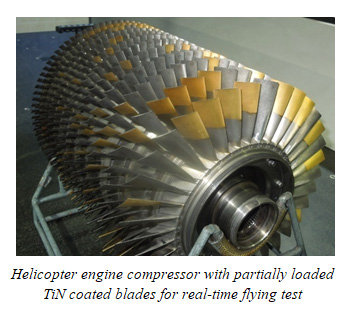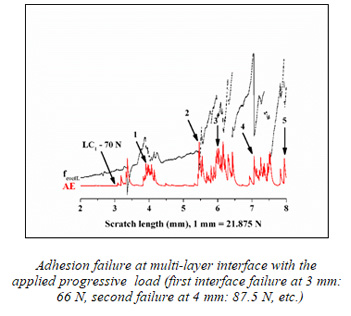 Researchers at the International Advanced Research Centre for Powder Metallurgy & New Materials (ARCI), Hyderabad, an autonomous R&D Centre of the Department of Science & Technology have developed erosion-resistant, eco-friendly coatings to protect the compressor components of engines of airplanes which are exposed to extreme conditions specially during landing and takeoff.
Researchers at the International Advanced Research Centre for Powder Metallurgy & New Materials (ARCI), Hyderabad, an autonomous R&D Centre of the Department of Science & Technology have developed erosion-resistant, eco-friendly coatings to protect the compressor components of engines of airplanes which are exposed to extreme conditions specially during landing and takeoff.
Components on the compressor side of an engine of an airplane are subject to severe operating conditions, including high temperatures and high erosion wear rates. Titanium (Ti) alloys, because of their high strength-to-weight ratio and high-temperature stability, are used to manufacture the aero-engine compressor’s rotary components. However, relatively poor erosion resistance of ‘Ti’ alloys against particle’s impact during landing and take-off necessitate rather frequent replacement of compressor blades so as to keep the fuel consumption and engine life under control.
The unique erosion-resistant, eco-friendly coating developed by ARCI may reduce the frequency of replacement of these blades. It comprises of multi-layered TiN (5 - 10 µm thick) coatings with significantly reduced interfacial stresses. These coatings have been successfully demonstrated in a helicopter engine. On the other hand, the laboratory studies pertaining to much more advanced multi-layer TiCrN (5 - 20 µm) coating were completed, and real-time tests are under progress.
The coating has been developed using the Cathodic Arc Physical Vapor Deposition technique (CA-PVD) a process in which material is evaporated from its source and made it to condense on a desired surface or component, forming a thin film or coating. Among various evaporation processes available, arc evaporation process results in a highly adherent coating.
 ARCI has adopted a novel Cylindrical Cathodic Arc Deposition process for developing both TiN & TiCrN multi-layer coatings. In addition to the utilization of such an advanced technique, the best deposition parameters were also identified for achieving minimal defects, low residual stress, good adhesion strength, and in turn, the best possible erosion resistance. Considering the actual conditions prevailing in airplane engines, detailed studies with respect to the fatigue and microstructural integrity were also carried out.
ARCI has adopted a novel Cylindrical Cathodic Arc Deposition process for developing both TiN & TiCrN multi-layer coatings. In addition to the utilization of such an advanced technique, the best deposition parameters were also identified for achieving minimal defects, low residual stress, good adhesion strength, and in turn, the best possible erosion resistance. Considering the actual conditions prevailing in airplane engines, detailed studies with respect to the fatigue and microstructural integrity were also carried out.
“The road to building an empowered Atamanirbhar Bharat goes through R&D for the relevant products with global quality. ARCI developed functional coatings such as for erosion and corrosion resistance are a good example of that with applications in a plethora of sectors,” said Prof Ashutosh Sharma, Secretary, DST.
The advanced TiCrN coating of 20 µm thickness is a superior alternate to the TiN coating as the adhesion strength, and the erosion resistance of the optimized TiCrN coating is found to be very high. In the case of thicker TiCrN coatings, the adhesion or erosion failures take place preferentially at multi-layer interfaces, therefore protecting the substrate-coating interface for prolonged periods leading to a significantly enhanced erosion resistance. These advanced TiCrN coatings could be useful in meeting several strategic requirements of the country.
Publication links:
1. “Studies on cathodic arc PVD grown TiCrN based erosion-resistant thin films.”
Krishna Valleti, Puneet C, Rama Krishna L, and Shrikant V. Joshi Journal of Vacuum Science & Technology A 34, 041512 (2016); DOI: 10.1116/1.4953466
2. “Effect of Pulsed Biasing on the Droplet Formation and the Properties of Cylindrical Cathodic Arc–Grown Erosion-Resistant TiN Coatings.”
Krishna Valleti, K. Sai Jyotheender & D. Srinivasa Rao
Tribology Transactions, Volume 62, 2019 - Issue 1, 88-95, DOI: 10.1080/10402004.2018.1502856
For more details, Dr. Krishna Valleti (krishna[at]arci[dot]res[dot]in) can be contacted.






























